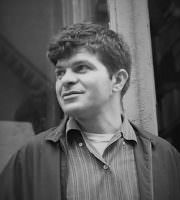About Gregory Corso
Gregory Corso (March 26, 1930 in Greenwich Village, New York City – January 17, 2001 in Robbinsdale, Minnesota) was an American poet of the Beat Generation. Corso's parents, Italian immigrants, were both only 17 and 16 years old when he was born. A year later his mother left the family to return to Italy. As a result, Corso had to spend most of his childhood in orphanages and foster homes. His father remarried when Corso was eleven. The boy could stay with him, but often ran away. He also ran away from a children's home. During his troubled youth, he spent several months in Tombs Prison in New York and Bellevue Hospital Center on observation for the theft of a radio. At 18, he was sentenced to three years in the Clinton State Prison in upstate New York for burglary. During this period of imprisonment he began to read literature, in particular he became such a great admirer of the unconventional and linguistically brilliant poet Percy Bysshe Shelley that on a later visit to Oxford he visited his former student room and kissed the floor on which Shelley had walked. Corso also dabbled in Greek mythology, philosophy, and history. He also began to write his own poems while in prison.Released in 1950, he returned to New York City and met Allen Ginsberg in Greenwich Village. In their first long conversation, they discovered that Corso had previously observed Ginsberg and his girlfriend having sex, since they both lived on opposite sides of the street. Ginsberg introduced Corso to the other Beat writers. Corso, as Ted Morgan paraphrasedly wrote in Literary Outlaw: The Life and Times of William S. Burroughs, was the junior partner of Ginsberg, Kerouac, and William S. Burroughs, accepted and valued but not fully equal in the Alliance of Columbia Intellectuals and Times Square Hipsters.
Corso worked for the Los Angeles Examiner in 1952 and, like Jack Kerouac, went to sea with the merchant marine. In 1954 he took some unregistered courses at Harvard, where he also collected input for his first publication of poetry (The Vestal Lady on Brattle and Other Poems). He followed the other beatniks to San Francisco in 1956, where Lawrence Ferlinghetti published his poetry collection Gasoline. Along with Kerouac and Ginsberg, he did some unconventional readings and interviews in 1957 and also toured Mexico, Western and Eastern Europe.
In the early 1960s, Corso taught poetry for a semester at New York State University in Buffalo and at the Naropa Institute (now a university) in Boulder. He lost his job at Buffalo in 1965 for refusing to sign the Feinberg Loyalty Oath, introduced in the McCarthy era as a means of keeping Communism out of campuses. Corso said he didn't want to sign the statement because Shelley wouldn't either. In addition to Shelley, he also admired Friedrich Hölderlin and Emily Dickinson.
Corso died in Minnesota after a long battle with prostate cancer. He was buried in the Protestant cemetery in Rome, close to his model, Shelley.
Browse all poems and texts published on Gregory Corso









